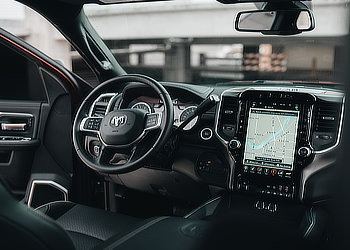Autonomous Delivery Vehicles
Las Vegas, Nevada
Driving innovation of autonomous delivery vehicles

In the rapidly evolving landscape of modern transportation, autonomous delivery vehicles (ADVs) have emerged as a pioneering innovation to revolutionize how we transport and deliver goods and services.
What are ADVs?
Autonomous delivery vehicles (ADV) are self-driving vehicles designed to transport goods from one location to another without human intervention. These vehicles can vary in size and form, from small robotic devices to large trucks, and they use a combination of sensors, cameras, radar, lidar, and artificial intelligence (AI) algorithms to navigate and make decisions while on the road.
Delivery vehicles in Las Vegas
In Southern Nevada, the Nuro company is testing its autonomous delivery vehicles on public roads. Nuro delivery vehicles carry goods, not passengers. Nuro vehicles operate locally and can bring small parcels, medicine, and groceries to people in a neighborhood.
Where are autonomous delivery vehicles used?
• Logistics and warehousing: Warehouses and logistics centers utilize autonomous delivery vehicles for material handling tasks, such as moving goods within warehouses or loading and unloading cargo. Over 750,000 robots do the heavy lifting and other operations in Amazon warehouses.
• Healthcare: Commercial self-flying drones can transport critical medical supplies, vaccines, blood, and essential equipment to remote or underserved regions with limited access to conventional transportation. Drones can also be mobile telemedicine stations, facilitating real-time video and audio communication between patients and healthcare providers in distant or isolated areas.
• Interstate commerce. The trucking industry can benefit a lot from using autonomous delivery vehicles. Self-driving trucks transporting cargo interstate can run non-stop for hundreds or tens of thousands of miles.
In Nevada, testing of autonomous delivery trucks started in 2015.
• Food delivery: Companies in the food industry (e.g., small grocery stores or restaurants) employ autonomous delivery vehicles for last-mile delivery. These vehicles can keep food hot or cold and ensure quality. The food delivery robots have been operating in Nevada on UNLV campuses in Reno and Las Vegas for the last few years.
• Autonomous transportation: Autonomous shuttles are increasingly used in public transportation systems to provide first-mile and last-mile connectivity. In Las Vegas, mini buses or shuttles run on and off in downtown Las Vegas around Fremont Street
Legal and regulatory rules for autonomous delivery vehicles
• Permits for testing and deployment: The Nevada DMV issues permits to operate an ADV on the road in Nevada.
According to the Nevada DMV website, "Nevada does not issue a permit or license based on an autonomous vehicle's level of automation, nor does the DMV test or certify vehicles. Nevada law allows all automation levels to operate on public streets."
Furthermore, "Manufacturers, software developers and others interested in testing their vehicles in Nevada must submit an application to the DMV Department along with a) proof that one or more of your autonomous vehicles have been driven for a combined minimum of at least 10,000 miles, b) a complete description of your autonomous technology, c) a detailed safety plan, and d) your plan for hiring and training your test drivers." For more information check https://dmv.nv.gov.
• Driver licensing: Depending on the type of vehicle, autonomous delivery vehicles may or may not require a human driver behind the wheel. However, most of the autonomous delivery vehicles you see on the road are Level 3 automation, which means - there is a driver behind the wheel, and in an emergency, the driver should take control of the vehicle. It also means that drivers operating these vehicles must have a valid driver's license for their vehicle type.
• Insurance requirements: To test the autonomous vehicle on Nevada public roads, the operator must submit proof of insurance or self-insurance for $5,000,000. (See NRS 482A.060.)
The food delivery robot operators in Las Vegas or Nevada must maintain liability insurance of at least $100,000. (See Senate Bill 422.) Most food delivery robots operate in a closed space, like college campuses.
• Liability: The question of liability in the event of accidents or incidents involving ADVs is a complex legal issue. Nevada doesn't have special laws for that, which means - the current rules will apply. Based on the existing laws, the negligent party is financially responsible for all damages, including medical bills (past, present, future), lost wages, damaged property, and pain and suffering.
• Compliance & interstate regulations. You must comply with other states' laws to drive across the state line.
In 2023, the California State Assembly passed Assembly Bill 316 (AB316), affecting the operation of self-driving trucks. The bill required autonomous vehicles weighing over 10,000 pounds to have a human driver behind the wheel when operating on the CA state's roads. So far, the California Governor vetoed the bill, but if the legislature chooses to vote in favor of it, they can overturn the governor's veto.
Nevada has no restrictions, but if the self-driving truck needs to cross the state line, it must comply with other state laws.
Challenges of ADVs
Autonomous delivery vehicles face many challenges.
• Technical challenges: Autonomous delivery vehicles must navigate complex and dynamic environments, which can be challenging due to varying road conditions, weather, sand storms, extreme heat, like in Nevada, and other unexpected events.
• Regulatory and legal issues: The deployment of ADVs often faces legal and regulatory hurdles. For example, food delivery robots can run in a closed environment but cannot cross the street or be on a sidewalk. In 2023, Nevada's lawmakers created a new safety regulation, Senate Bill SB422, to allow food delivery robots to operate on crosswalks and sidewalks everywhere. The new bill will go into effect in January 2024.
• Security concerns: ADVs are susceptible to cybersecurity threats, including hacking attempts that could compromise their safety.
• Initial costs: Developing and deploying ADVs can be expensive and a barrier for smaller businesses.
• Acceptance and trust: Building public confidence in autonomous delivery vehicles is essential. Some people may hesitate to accept fully autonomous delivery vehicles on the road.
Benefits of ADVs
• Efficiency: ADVs can operate 24/7, improving delivery speed and reducing delivery times. They can optimize routes, saving fuel and time.
• Cost savings: With reduced labor costs and improved efficiency, ADVs can lower operational expenses for companies.
• Safety: Autonomous vehicles can minimize the risk of human errors, such as distracted driving or fatigue-related accidents, potentially improving road safety.
• Reduced emissions: Many ADVs are electric or hybrid, which can contribute to reduced greenhouse gas emissions and lower environmental impact.
• Accessibility: ADVs can provide delivery services in remote or underserved areas, increasing accessibility to goods and services.
Final thoughts
Autonomous delivery vehicles reshape how we deliver goods and services. However, their widespread adoption faces various challenges, including regulatory complexities, safety concerns, and the need to establish trust with the public.
We plan to follow the laws surrounding autonomous delivery vehicles very closely and update this article with new information as soon as it becomes available.
Stay tuned!
Last updated on February 3, 2025.

